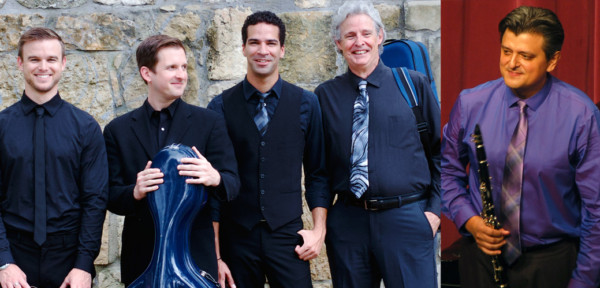AEOLUS QUARTET WITH ALEJANDRO HERNANDEZ-VALDEZ
Tuesday, June 7, 2022 | 7:30 PM
Trinity Episcopal Church
1501 N. Glass St.
FLORENCE PRICE (1887-1953)
String Quartet in G Major
- Allegro
- Andante moderato — Allegretto
ANTONÍN DVOŘÁK (1841-1904)
String Quartet No. 12 in F major, Op. 96
- Allegro ma non troppo
- Lento
- Molto vivace
- Finale: vivace ma non troppo
INTERMISSION
ANTONÍN DVOŘÁK
Piano Quintet No. 2 in A major, Op. 81
- Allegro ma non tanto
- Dumka. Andante con moto
- Scherzo (Furiant). Molto vivace — Poco tranquillo
- Finale. Allegro
AEOLUS QUARTET
Nicholas Tavani, violin
Rachel Shapiro, violin
Caitlin Lynch, viola
Yi Qun Xu, cello
Alejandro Hernandez-Valdez, piano

Sponsors


Ben & Gay Heilker
Mark & Melanie Klotzman
Jay & Barbara Lack
This concert is generously supported by our concert sponsors and by donors to the Victoria Bach Festival’s Annual Fund. Many thanks to our generous supporters!
Florence Price (1887–1953) was born in Little Rock, AR to James H. Smith, the only black dentist in town, and Florence Smith, a schoolteacher and trained musician who also ran a restaurant. Well-known figures such as writer Langston Hughes and statesman Frederick Douglass were guests in their home when she was a child. After giving her first performance at the age of four, Price studied with her mother and later earned a degree at the New England Conservatory of Music in Boston MA, one of few conservatories of the era that would accept African American students. She graduated at the age of 18.
NEC’s openness encouraged her to break away from the barriers of piano works and art songs, long deemed the sole appropriate genres for female composers. NEC professors also followed the lead of nationalist composers like Dvořák in encouraging American students to celebrate the musical legacies of homegrown folk culture. Price’s 1933 Symphony in E minor, premiered by the Chicago Symphony, was only the second such work by an American woman premiered by a major American orchestra, the first by Amy Beach in 1896.
At first glance, her two-movement quintet may seem unfinished since the standard work of this genre has four movements (allegro, slow, minuetto or scherzo, allegro or moderato), but three movements (fast, slow, fast) were also an option. In this work, the second movement takes on the role of two, beginning in the slowest tempo of the work, but moving back and forth with a scherzo-like allegretto. The elegance of her melodic lines blends comfortably with the rich harmonies that serve as her home base.
In 1893, Antonín Dvořák (1841–1904) spent the summer away from home in Spillville, Iowa. Born in what was then known as Bohemia, he had come to the US to head the newly formed National Conservatory of Music. His English interpreter, American violinist Josef Jan Kovarík, had family in Spillville’s small community of Czech emigrés, where the great composer with his wife and six children stayed. In this very productive summer, Dvořák wrote this quartet, the “New World” Symphony, and a string quintet.
The parlor music style made famous by Stephen Collins Foster (1826–1864) appears from the beginning of opus 96, but Dvořák infuses the music with enough sincere pathos to create sensitivity without excessive sentimentality. This is especially the case for the poignant Lento, a movement sharing some of his modal references to Native American sagas treated more expansively in his “New World” Symphony, op 95. The heartrending conclusion of this movement immediately leads to a scherzo labeled “molto vivace” but which is actually a free-floating mosaic of tempo changes repeatedly returning to the opening theme like children coming home for supper worn out after a hard day’s play. The bustling nature of the final movement projects an image of a happy family gathering.
This entire quartet is an American “grand tour” of styles representing our melting pot with vignettes of sizzling drama, bubbly dancing, genteel love songs, and a bit of playful syncopation that might have been seen on the minstrel show stage.
Opus 81, a piece written in his native land represents what an earlier age called Emfindsamkeit. Using the harmonic language of the Romantic era, his first movement exposes the turbulence of quickly changing emotions for which the “sensitive” style was legendary. There are also elements of Sturm und Drang, a stylistic movement that tosses back and forth between stormy and dramatic emotions. But the master touch is the delicacy interwoven throughout the movement.
This delicacy continues in the “Dumka” movement, “dumka” being a Ukrainian word for a pensive state of mind. Although the second half of this movement is labeled “a tiny bit more motion,” there is actually a substantial change in character from drama to sparkling lyricism hinting at the playfulness heard in the brief scherzo based on the lively Czech dance of shifting rhythms called the “Furiant.” The finale returns to Emfindsamer style, but this time with a more joyful atmosphere, similar to the American quartet. Drama and delight, melancholy and merriment, Dvořák and Price, his musical descendant, traverse a world of music, only to find there’s no place like home.
–Dr. Yvonne Kendall, © 2022
PROGRAM NOTES: No Place Like Home
Florence Price (1887–1953) was born in Little Rock, AR to James H. Smith, the only black dentist in town, and Florence Smith, a schoolteacher and trained musician who also ran a restaurant. Well-known figures such as writer Langston Hughes and statesman Frederick Douglass were guests in their home when she was a child. After giving her first performance at the age of four, Price studied with her mother and later earned a degree at the New England Conservatory of Music in Boston MA, one of few conservatories of the era that would accept African American students. She graduated at the age of 18.
NEC’s openness encouraged her to break away from the barriers of piano works and art songs, long deemed the sole appropriate genres for female composers. NEC professors also followed the lead of nationalist composers like Dvořák in encouraging American students to celebrate the musical legacies of homegrown folk culture. Price’s 1933 Symphony in E minor, premiered by the Chicago Symphony, was only the second such work by an American woman premiered by a major American orchestra, the first by Amy Beach in 1896.
At first glance, her two-movement quintet may seem unfinished since the standard work of this genre has four movements (allegro, slow, minuetto or scherzo, allegro or moderato), but three movements (fast, slow, fast) were also an option. In this work, the second movement takes on the role of two, beginning in the slowest tempo of the work, but moving back and forth with a scherzo-like allegretto. The elegance of her melodic lines blends comfortably with the rich harmonies that serve as her home base.
In 1893, Antonín Dvořák (1841–1904) spent the summer away from home in Spillville, Iowa. Born in what was then known as Bohemia, he had come to the US to head the newly formed National Conservatory of Music. His English interpreter, American violinist Josef Jan Kovarík, had family in Spillville’s small community of Czech emigrés, where the great composer with his wife and six children stayed. In this very productive summer, Dvořák wrote this quartet, the “New World” Symphony, and a string quintet.
The parlor music style made famous by Stephen Collins Foster (1826–1864) appears from the beginning of opus 96, but Dvořák infuses the music with enough sincere pathos to create sensitivity without excessive sentimentality. This is especially the case for the poignant Lento, a movement sharing some of his modal references to Native American sagas treated more expansively in his “New World” Symphony, op 95. The heartrending conclusion of this movement immediately leads to a scherzo labeled “molto vivace” but which is actually a free-floating mosaic of tempo changes repeatedly returning to the opening theme like children coming home for supper worn out after a hard day’s play. The bustling nature of the final movement projects an image of a happy family gathering.
This entire quartet is an American “grand tour” of styles representing our melting pot with vignettes of sizzling drama, bubbly dancing, genteel love songs, and a bit of playful syncopation that might have been seen on the minstrel show stage.
Opus 81, a piece written in his native land represents what an earlier age called Emfindsamkeit. Using the harmonic language of the Romantic era, his first movement exposes the turbulence of quickly changing emotions for which the “sensitive” style was legendary. There are also elements of Sturm und Drang, a stylistic movement that tosses back and forth between stormy and dramatic emotions. But the master touch is the delicacy interwoven throughout the movement.
This delicacy continues in the “Dumka” movement, “dumka” being a Ukrainian word for a pensive state of mind. Although the second half of this movement is labeled “a tiny bit more motion,” there is actually a substantial change in character from drama to sparkling lyricism hinting at the playfulness heard in the brief scherzo based on the lively Czech dance of shifting rhythms called the “Furiant.” The finale returns to Emfindsamer style, but this time with a more joyful atmosphere, similar to the American quartet. Drama and delight, melancholy and merriment, Dvořák and Price, his musical descendant, traverse a world of music, only to find there’s no place like home.
–Dr. Yvonne Kendall, © 2022
About the Artists

Nicholas TAVANI
Violinist Nicholas Tavani was born in Arlington, VA, and debuted in Washington, D.C.’s Gaston Hall at the age of eight. The Cleveland Plain Dealer praised him as “ an alert and sensitive artist, with beautiful tone and exquisite phrasing,” and the Washington Post has hailed his “brilliant musicianship.” As a chamber musician, recitalist, and concerto soloist, Mr. Tavani has performed extensively to critical acclaim in the United States and around the world. As first violinist of the Aeolus Quartet, he was a winner of the 2011 Plowman International Chamber Music Competition, the 2011 Yellow Springs Chamber Music competition, and the 2009 Coleman International Chamber Music Competition. He is also a laureate of the Postacchini and Kingsville International Violin Competitions.
Mr. Tavani serves as first violinist in the Aeolus Quartet, who are currently Artists in Residence at Musica Viva New York. In addition, he serves as concertmaster of the New Orchestra of Washington and is a member of the Mark Morris Dance Group Music Ensemble and the Smithsonian Chamber Players.
A passionate advocate of new music, Mr. Tavani has premiered and recorded several works by living composers, including Samuel Adler, Alexandra Bryant, Christopher Theofanidis, Missy Mazzoli, and Dan Visconti. His discography includes four albums with the Aeolus Quartet in wide release on the Azica, Naxos, and Innova labels. Solo performances with orchestra include the St Paul Chamber Orchestra, Arlington Symphony, Aspen Festival Orchestra, Prince William Symphony, New Orchestra of Washington, and many others. Collaborations include Renee Fleming, Peter Salaff, Jon Kimura Parker, Daxun Zhang, and Michael Tree.
Mr. Tavani’s current season includes chamber, recital and concerto performances across the US and extensive touring across the US with the Aeolus Quartet.
As a committed educator, Mr. Tavani has served on the faculties of the George Washington University School of Music, Point CounterPoint Music Festival, the MasterWorks Festival, and the University of Maryland High School Music Academy. He served as teaching assistant to the Juilliard Quartet at the Juilliard School, where he studied with Joseph Lin and Ronald Copes, and the Aeolus Quartet was 2013-2015 Graduate Quartet in Residence. Mr. Tavani completed a doctorate under the mentorship of David Salness at the University of Maryland. His thesis was titled Quantifying Dynamic Pitch Adjustment Decision Structures in String Quartet Performance. An alumnus of the Cleveland Institute of Music, Nicholas studied violin with William Preucil and chamber music with Peter Salaff and the Cavani Quartet. In addition to a Bachelor of Music in Violin Performance from CIM, Nicholas also studied mathematical physics at Case Western Reserve University.
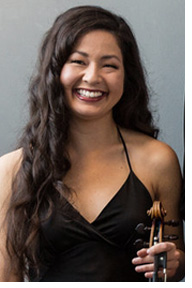
Rachel SHAPIRO
Brooklyn-based violinist Rachel Kitagawa Shapiro began playing violin at age four in her hometown of Reading, PA. She has since performed in venues such as Carnegie Hall, Wigmore Hall, and across the United States, Canada, Mexico, the United Kingdom, Norway, Germany, the Czech Republic, the United Arab Emirates, India, China, South Korea, and Japan.
Founding member and second violinist of the critically acclaimed Aeolus Quartet, her playing has been praised by Mark Satola of the Cleveland Plain Dealer, “in a beautifully balanced interlude wherein the second violin dances attendant to a heartfelt melody… Rachel Shapiro [was] outstanding here.” Collaborations include a performance on the Metropolitan Opera stage alongside Renée Fleming, as well as appearances with Michael Tree, Jon Kimura Parker, the Juilliard Quartet, and the Miró Quartet. She has performed as a guest with the Mark Morris Dance Group Music Ensemble, A Far Cry, the Orpheus Chamber Orchestra, and the New York Philharmonic.
Ms. Shapiro is an adjunct Professor of Violin at Montclair State University and has previously served as Professorial Lecturer at the George Washington University, guest Teaching Artist at the Brooklyn High School of the Arts, and on violin and chamber music faculties at summer programs such as the Bennington Chamber Music Conference, Texas Christian University College of Fine Arts Intensive Quartet Workshop, and Kinhaven Music School. She has recorded for Naxos and Azica record labels and on a recent album by The National.
Ms. Shapiro holds an Artist Diploma from the Juilliard School, a Doctor of Musical Arts from the University of Maryland, a Master of Music from the University of Texas at Austin, and a Bachelor of Music from the Cleveland Institute of Music. With a minor in English Literature, Ms. Shapiro is an avid writer and has been published in Strings magazine.
Ms. Shapiro performs on a 1991 Samuel Zygmuntowicz violin graciously on loan to her through the Five Partners Foundation.
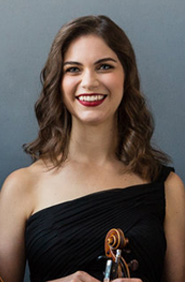
Caitlin LYNCH
Violist and Grammy Award recipient Caitlin Lynch has performed across the globe in collaboration with artists from Itzhak Perlman to Radiohead’s Jonny Greenwood. She is violist of the Aeolus String Quartet, and a member and co-Artistic Director of the conductorless chamber orchestra A Far Cry. Ms. Lynch’s performances as a chamber and orchestral musician, soloist with orchestra, and recitalist have spanned fourteen countries across five continents – from Carnegie Hall to the Sydney Opera House to the United Nations – and include appearances with members of the Tokyo, Cleveland, Juilliard, and Guarneri String Quartets. Passionate about collaborations with other art forms, she enjoys performing with dancers (Mark Morris Dance Group, Wendy Whelan), artists from other musical genres (Bjork, The National), and on film (Darren Aronofsky’s Mother!). Ms. Lynch is the founder and Artistic Director of Project Chamber Music: Willamette Valley, a nonprofit organization that supports public school music programs and provides funds for private instrumental lessons for students for whom the cost would be otherwise prohibitive. She was an Artist in Residence at Cleveland’s Judson Manor senior living community, an intergenerational relationship that continues today and has been celebrated by CBS and NBC News, The Plain Dealer, and the New York Times. Recent and upcoming highlights include performances at the Chamber Music Society at Lincoln Center and Lincoln Center’s Great Performers Series with the Aeolus Quartet, the Kennedy Center with A Far Cry, and BAM’s Next Wave Festival. Ms. Lynch performs on an 18th century viola made by English luthier William Forster, and thanks to the generosity of the Five Partners Foundation, a viola by Samuel Zygmuntowicz.
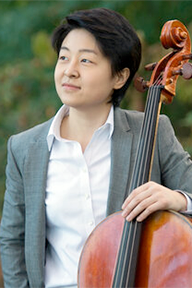
Yi Qun Xu
Praised for displaying “great poise and masterful technique” and possessing “an amazing rich tone” by The Day, cellist Yi Qun Xu has performed extensively as a soloist and chamber musician across the United States. A native of China, Yi Qun was mesmerized by the cello soon after her eighth birthday. She came to the U.S. after studying with Yuan Chen and Yi-Bing Chu at China’s Central Conservatory of Music, where she won multiple top prizes in Chinese national cello competitions.
Yi Qun is the recipient of the 2022 Presser Music Award as well as the first-prize winner of the 2021 New York International Artists Cello Competition. As the winner of the 2018 Sanders-Juilliard-Tel Aviv Museum prize, she was presented in recital at the influential Tel Aviv Museum of Art in Israel. She is also the first prize winner at the 58th Eastern Connecticut Symphony Instrumental Competition as well as the 7th International Antonio Janigro Competition in Croatia.
As a passionate chamber musician, she has been heard at the Chamber Music Society of Lincoln Center’s Cellists of Lincoln Center Concert and the prestigious Marlboro Music Festival. Yi Qun has been an active participant of the inspirational Perlman Music Program, founded Toby and Itzhak Perlman. She has also been part of music festivals such as Heifetz International Music Institute, International Musicians Seminar Prussia Cove, Kneisel Hall Music Festival, Music@Menlo, the Olympic Music Festival, and Piatigorsky International Cello Festival. She has collaborated with artists including Itzhak Perlman, Ani Kavafian, Ida Kavafian, Hsin-Yun Huang, Carter Brey, Timothy Eddy, David Finckel, Ralph Kirshbaum, members of the Cleveland, Juilliard, Tokyo, Ébène Quartets.
As an educator and musical ambassador, Yi Qun is a faculty member of The Juilliard School Pre-College’s Music Advancement Program, and she serves as Joel Krosnick’s teaching assistant at The Juilliard School. She has worked with chamber music groups at Kneisel Hall Chamber Music Festival’s Adult Chamber Music Institute and ArtsAhimsa Music Festival. She has taught master classes as a guest artist at the Bak Middle School for the Arts and Saco River Theatre. She has performed for community engagement events for communities in Los Angeles, Maine, New York City, New Hampshire, Palm Beach, Shelter Island, Tianjin, Beijing, and Shanghai in China.
A protégé of Timothy Eddy, Ronald Leonard, and Laurence Lesser, she studies with Joel Krosnick as a C.V. Starr Doctoral Fellow at The Juilliard School, where she was a proud recipient of a Kovner Fellowship. Her performances are featured on Alec Baldwin’s podcast “Here is the Thing” and WQXR’s “Midday Masterpieces.” Yi Qun will be joining the Musicians from Marlboro tour (2021-2022 and 2022-2023 seasons).
She recently made her first short-film appearance in composer Lingbo Ma’s musical film, What’s Next, a short film documenting a person’s inner journey of struggle during the COVID-19 pandemic.
Yi Qun is the founding Artistic Director of Noree Chamber Soloists, a New York-based chamber music ensemble.
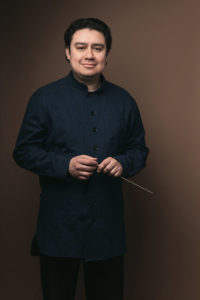
Alejandro Hernandez-Valdez
Esteemed conductor and pianist Dr. Alejandro Hernandez-Valdez was named Artistic Director of Musica Viva NY and Director of Music of the historic Unitarian Church of All Souls in Manhattan in 2015. He is also Co-Founder of the New Orchestra of Washington and Artistic Director of the Victoria Bach Festival. He has earned accolades from The Washington Post as a conductor “with the incisive clarity of someone born to the idiom,” as well as praise from The New York Times for leading “a stirring performance” of Brahms’ Ein Deutsches Requiem. At a concert commemorating the 100th Anniversary of the WWI Armistice (featuring the world premiere of Joseph Turrin’s cantata And Crimson Rose Once Again Be Fair) Oberon’s Grove wrote: “Maestro Alejandro Hernandez-Valdez drew rich, warm sounds from the musicians” in “a beautiful and deeply moving program.” He is featured in El mundo en las manos/Creadores mexicanos en el extranjero (The World in Their Hands/Creative Mexicans Abroad), a book by the Mexican Ministry of Foreign Affairs honoring Mexican nationals who are leading figures in diverse artistic fields. He is the recipient of a 2016 Shenandoah Conservatory Alumni of Excellence Award for his exemplary contribution to his profession, national level of prominence, and exceptional integrity. He resides in New York City and Washington, D.C.
In 2016, during its 40th anniversary season, Hernandez-Valdez was named the third Artistic Director of the Victoria Bach Festival in Texas. As Mike Greenberg wrote in Classical Voice America: “A big question mark hung over the venerable Victoria Bach Festival two years ago when the brilliant Craig Hella Johnson, its artistic director since 1992, decided to give up the post…Johnson’s successor has replaced the question mark with an exclamation point — perhaps more appropriately, given his Spanish name and Mexican provenance, two exclamation points: ¡Alejandro Hernandez-Valdez!”…“The results,” Greenberg continued, “were astonishing.”
Since taking the helm at Musica Viva NY, described recently by The New York Times as “an excellent chorus,” Hernandez-Valdez has presented an exceptionally broad repertoire in each of the choir’s seasons, focusing on transformative interpretations to engage and inspire the audience, and exploring the acoustical limits of the All Souls Church sanctuary. Founded in 1977, the ensemble has a longstanding tradition of top-caliber performances, innovative programming, and strong dedication to the commissioning of new works. Its alumni include Renée Fleming and Samuel Ramey.
As the Artistic Director and Co-Founder of the New Orchestra of Washington, a chamber orchestra that “has constituted itself in the forefront of this smaller-is-better movement” (The Washington Post), Hernandez-Valdez has led two performances for Trinity Wall Street’s concert series: the New York premiere of Julian Wachner’s Chamber Symphony (a New Orchestra of Washington commission), and Gustav Mahler’s Fourth Symphony, which the ensemble also recorded. In October of 2017, the New Orchestra of Washington released Bespoke, a new CD featuring works by Joel Friedman, Elena Ruehr, and Julian Wachner that were tailor-made for the innovative Washington D.C. based ensemble.
His guest conducting engagements include appearances at The Kennedy Center in Washington, D.C., Lincoln Center in New York City, and the Degollado Theatre in Guadalajara, Mexico, where he led the Jalisco Philharmonic. As a pianist, Hernandez-Valdez performed for the 2013 Britten100 festival in New York, organized by the Britten-Pears Foundation to honor the 100th anniversary of the titular composer’s birth. As a composer and conductor, he helmed the premiere of his own composition, “The Imaginary City,” a cantata inspired by the life of Ramzi Aburedwan, a violist who has opened schools throughout Palestine to teach music to underprivileged children. He also arranged and premiered the chamber orchestra version of “A Song of Nature” by Seymour Bernstein. Mr. Bernstein, the subject of Ethan Hawke’s 2014 documentary film, “Seymour: An Introduction,” is one of Hernandez-Valdez’s most influential teachers and mentors.
About the Artists

Nicholas TAVANI, violin
Violinist Nicholas Tavani was born in Arlington, VA, and debuted in Washington, D.C.’s Gaston Hall at the age of eight. The Cleveland Plain Dealer praised him as “ an alert and sensitive artist, with beautiful tone and exquisite phrasing,” and the Washington Post has hailed his “brilliant musicianship.” As a chamber musician, recitalist, and concerto soloist, Mr. Tavani has performed extensively to critical acclaim in the United States and around the world. As first violinist of the Aeolus Quartet, he was a winner of the 2011 Plowman International Chamber Music Competition, the 2011 Yellow Springs Chamber Music competition, and the 2009 Coleman International Chamber Music Competition. He is also a laureate of the Postacchini and Kingsville International Violin Competitions.
Mr. Tavani serves as first violinist in the Aeolus Quartet, who are currently Artists in Residence at Musica Viva New York. In addition, he serves as concertmaster of the New Orchestra of Washington and is a member of the Mark Morris Dance Group Music Ensemble and the Smithsonian Chamber Players.
A passionate advocate of new music, Mr. Tavani has premiered and recorded several works by living composers, including Samuel Adler, Alexandra Bryant, Christopher Theofanidis, Missy Mazzoli, and Dan Visconti. His discography includes four albums with the Aeolus Quartet in wide release on the Azica, Naxos, and Innova labels. Solo performances with orchestra include the St Paul Chamber Orchestra, Arlington Symphony, Aspen Festival Orchestra, Prince William Symphony, New Orchestra of Washington, and many others. Collaborations include Renee Fleming, Peter Salaff, Jon Kimura Parker, Daxun Zhang, and Michael Tree.
Mr. Tavani’s current season includes chamber, recital and concerto performances across the US and extensive touring across the US with the Aeolus Quartet.
As a committed educator, Mr. Tavani has served on the faculties of the George Washington University School of Music, Point CounterPoint Music Festival, the MasterWorks Festival, and the University of Maryland High School Music Academy. He served as teaching assistant to the Juilliard Quartet at the Juilliard School, where he studied with Joseph Lin and Ronald Copes, and the Aeolus Quartet was 2013-2015 Graduate Quartet in Residence. Mr. Tavani completed a doctorate under the mentorship of David Salness at the University of Maryland. His thesis was titled Quantifying Dynamic Pitch Adjustment Decision Structures in String Quartet Performance. An alumnus of the Cleveland Institute of Music, Nicholas studied violin with William Preucil and chamber music with Peter Salaff and the Cavani Quartet. In addition to a Bachelor of Music in Violin Performance from CIM, Nicholas also studied mathematical physics at Case Western Reserve University.

Rachel SHAPIRO, violin
Brooklyn-based violinist Rachel Kitagawa Shapiro began playing violin at age four in her hometown of Reading, PA. She has since performed in venues such as Carnegie Hall, Wigmore Hall, and across the United States, Canada, Mexico, the United Kingdom, Norway, Germany, the Czech Republic, the United Arab Emirates, India, China, South Korea, and Japan.
Founding member and second violinist of the critically acclaimed Aeolus Quartet, her playing has been praised by Mark Satola of the Cleveland Plain Dealer, “in a beautifully balanced interlude wherein the second violin dances attendant to a heartfelt melody… Rachel Shapiro [was] outstanding here.” Collaborations include a performance on the Metropolitan Opera stage alongside Renée Fleming, as well as appearances with Michael Tree, Jon Kimura Parker, the Juilliard Quartet, and the Miró Quartet. She has performed as a guest with the Mark Morris Dance Group Music Ensemble, A Far Cry, the Orpheus Chamber Orchestra, and the New York Philharmonic.
Ms. Shapiro is an adjunct Professor of Violin at Montclair State University and has previously served as Professorial Lecturer at the George Washington University, guest Teaching Artist at the Brooklyn High School of the Arts, and on violin and chamber music faculties at summer programs such as the Bennington Chamber Music Conference, Texas Christian University College of Fine Arts Intensive Quartet Workshop, and Kinhaven Music School. She has recorded for Naxos and Azica record labels and on a recent album by The National.
Ms. Shapiro holds an Artist Diploma from the Juilliard School, a Doctor of Musical Arts from the University of Maryland, a Master of Music from the University of Texas at Austin, and a Bachelor of Music from the Cleveland Institute of Music. With a minor in English Literature, Ms. Shapiro is an avid writer and has been published in Strings magazine.
Ms. Shapiro performs on a 1991 Samuel Zygmuntowicz violin graciously on loan to her through the Five Partners Foundation.

Caitlin LYNCH, viola
Violist and Grammy Award recipient Caitlin Lynch has performed across the globe in collaboration with artists from Itzhak Perlman to Radiohead’s Jonny Greenwood. She is violist of the Aeolus String Quartet, and a member and co-Artistic Director of the conductorless chamber orchestra A Far Cry. Ms. Lynch’s performances as a chamber and orchestral musician, soloist with orchestra, and recitalist have spanned fourteen countries across five continents – from Carnegie Hall to the Sydney Opera House to the United Nations – and include appearances with members of the Tokyo, Cleveland, Juilliard, and Guarneri String Quartets. Passionate about collaborations with other art forms, she enjoys performing with dancers (Mark Morris Dance Group, Wendy Whelan), artists from other musical genres (Bjork, The National), and on film (Darren Aronofsky’s Mother!). Ms. Lynch is the founder and Artistic Director of Project Chamber Music: Willamette Valley, a nonprofit organization that supports public school music programs and provides funds for private instrumental lessons for students for whom the cost would be otherwise prohibitive. She was an Artist in Residence at Cleveland’s Judson Manor senior living community, an intergenerational relationship that continues today and has been celebrated by CBS and NBC News, The Plain Dealer, and the New York Times. Recent and upcoming highlights include performances at the Chamber Music Society at Lincoln Center and Lincoln Center’s Great Performers Series with the Aeolus Quartet, the Kennedy Center with A Far Cry, and BAM’s Next Wave Festival. Ms. Lynch performs on an 18th century viola made by English luthier William Forster, and thanks to the generosity of the Five Partners Foundation, a viola by Samuel Zygmuntowicz.

Yi Qun XU, cello
Praised for displaying “great poise and masterful technique” and possessing “an amazing rich tone” by The Day, cellist Yi Qun Xu has performed extensively as a soloist and chamber musician across the United States. A native of China, Yi Qun was mesmerized by the cello soon after her eighth birthday. She came to the U.S. after studying with Yuan Chen and Yi-Bing Chu at China’s Central Conservatory of Music, where she won multiple top prizes in Chinese national cello competitions.
Yi Qun is the recipient of the 2022 Presser Music Award as well as the first-prize winner of the 2021 New York International Artists Cello Competition. As the winner of the 2018 Sanders-Juilliard-Tel Aviv Museum prize, she was presented in recital at the influential Tel Aviv Museum of Art in Israel. She is also the first prize winner at the 58th Eastern Connecticut Symphony Instrumental Competition as well as the 7th International Antonio Janigro Competition in Croatia.
As a passionate chamber musician, she has been heard at the Chamber Music Society of Lincoln Center’s Cellists of Lincoln Center Concert and the prestigious Marlboro Music Festival. Yi Qun has been an active participant of the inspirational Perlman Music Program, founded Toby and Itzhak Perlman. She has also been part of music festivals such as Heifetz International Music Institute, International Musicians Seminar Prussia Cove, Kneisel Hall Music Festival, Music@Menlo, the Olympic Music Festival, and Piatigorsky International Cello Festival. She has collaborated with artists including Itzhak Perlman, Ani Kavafian, Ida Kavafian, Hsin-Yun Huang, Carter Brey, Timothy Eddy, David Finckel, Ralph Kirshbaum, members of the Cleveland, Juilliard, Tokyo, Ébène Quartets.
As an educator and musical ambassador, Yi Qun is a faculty member of The Juilliard School Pre-College’s Music Advancement Program, and she serves as Joel Krosnick’s teaching assistant at The Juilliard School. She has worked with chamber music groups at Kneisel Hall Chamber Music Festival’s Adult Chamber Music Institute and ArtsAhimsa Music Festival. She has taught master classes as a guest artist at the Bak Middle School for the Arts and Saco River Theatre. She has performed for community engagement events for communities in Los Angeles, Maine, New York City, New Hampshire, Palm Beach, Shelter Island, Tianjin, Beijing, and Shanghai in China.
A protégé of Timothy Eddy, Ronald Leonard, and Laurence Lesser, she studies with Joel Krosnick as a C.V. Starr Doctoral Fellow at The Juilliard School, where she was a proud recipient of a Kovner Fellowship. Her performances are featured on Alec Baldwin’s podcast “Here is the Thing” and WQXR’s “Midday Masterpieces.” Yi Qun will be joining the Musicians from Marlboro tour (2021-2022 and 2022-2023 seasons).
She recently made her first short-film appearance in composer Lingbo Ma’s musical film, What’s Next, a short film documenting a person’s inner journey of struggle during the COVID-19 pandemic.
Yi Qun is the founding Artistic Director of Noree Chamber Soloists, a New York-based chamber music ensemble.

Alejandro HERNANDEZ-VALDEZ, piano
Esteemed conductor and pianist Dr. Alejandro Hernandez-Valdez was named Artistic Director of Musica Viva NY and Director of Music of the historic Unitarian Church of All Souls in Manhattan in 2015. He is also Co-Founder of the New Orchestra of Washington and Artistic Director of the Victoria Bach Festival. He has earned accolades from The Washington Post as a conductor “with the incisive clarity of someone born to the idiom,” as well as praise from The New York Times for leading “a stirring performance” of Brahms’ Ein Deutsches Requiem. At a concert commemorating the 100th Anniversary of the WWI Armistice (featuring the world premiere of Joseph Turrin’s cantata And Crimson Rose Once Again Be Fair) Oberon’s Grove wrote: “Maestro Alejandro Hernandez-Valdez drew rich, warm sounds from the musicians” in “a beautiful and deeply moving program.” He is featured in El mundo en las manos/Creadores mexicanos en el extranjero (The World in Their Hands/Creative Mexicans Abroad), a book by the Mexican Ministry of Foreign Affairs honoring Mexican nationals who are leading figures in diverse artistic fields. He is the recipient of a 2016 Shenandoah Conservatory Alumni of Excellence Award for his exemplary contribution to his profession, national level of prominence, and exceptional integrity. He resides in New York City and Washington, D.C.
In 2016, during its 40th anniversary season, Hernandez-Valdez was named the third Artistic Director of the Victoria Bach Festival in Texas. As Mike Greenberg wrote in Classical Voice America: “A big question mark hung over the venerable Victoria Bach Festival two years ago when the brilliant Craig Hella Johnson, its artistic director since 1992, decided to give up the post…Johnson’s successor has replaced the question mark with an exclamation point — perhaps more appropriately, given his Spanish name and Mexican provenance, two exclamation points: ¡Alejandro Hernandez-Valdez!”…“The results,” Greenberg continued, “were astonishing.”
Since taking the helm at Musica Viva NY, described recently by The New York Times as “an excellent chorus,” Hernandez-Valdez has presented an exceptionally broad repertoire in each of the choir’s seasons, focusing on transformative interpretations to engage and inspire the audience, and exploring the acoustical limits of the All Souls Church sanctuary. Founded in 1977, the ensemble has a longstanding tradition of top-caliber performances, innovative programming, and strong dedication to the commissioning of new works. Its alumni include Renée Fleming and Samuel Ramey.
As the Artistic Director and Co-Founder of the New Orchestra of Washington, a chamber orchestra that “has constituted itself in the forefront of this smaller-is-better movement” (The Washington Post), Hernandez-Valdez has led two performances for Trinity Wall Street’s concert series: the New York premiere of Julian Wachner’s Chamber Symphony (a New Orchestra of Washington commission), and Gustav Mahler’s Fourth Symphony, which the ensemble also recorded. In October of 2017, the New Orchestra of Washington released Bespoke, a new CD featuring works by Joel Friedman, Elena Ruehr, and Julian Wachner that were tailor-made for the innovative Washington D.C. based ensemble.
His guest conducting engagements include appearances at The Kennedy Center in Washington, D.C., Lincoln Center in New York City, and the Degollado Theatre in Guadalajara, Mexico, where he led the Jalisco Philharmonic. As a pianist, Hernandez-Valdez performed for the 2013 Britten100 festival in New York, organized by the Britten-Pears Foundation to honor the 100th anniversary of the titular composer’s birth. As a composer and conductor, he helmed the premiere of his own composition, “The Imaginary City,” a cantata inspired by the life of Ramzi Aburedwan, a violist who has opened schools throughout Palestine to teach music to underprivileged children. He also arranged and premiered the chamber orchestra version of “A Song of Nature” by Seymour Bernstein. Mr. Bernstein, the subject of Ethan Hawke’s 2014 documentary film, “Seymour: An Introduction,” is one of Hernandez-Valdez’s most influential teachers and mentors.
